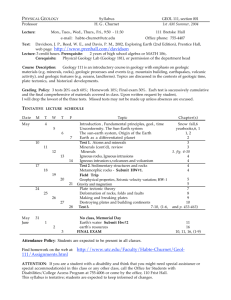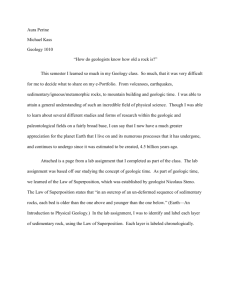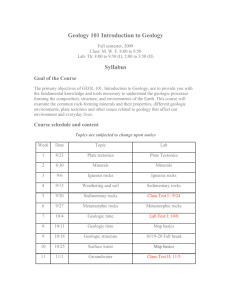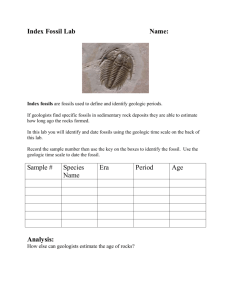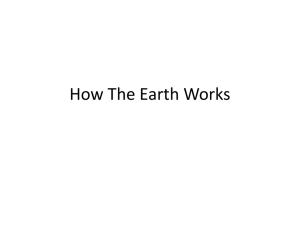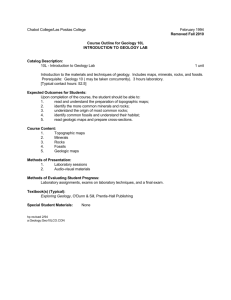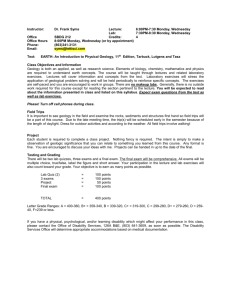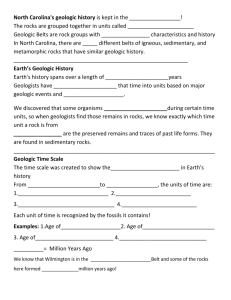Geology 100 - Spring 2011: Lecture and Lab Syllabi
advertisement
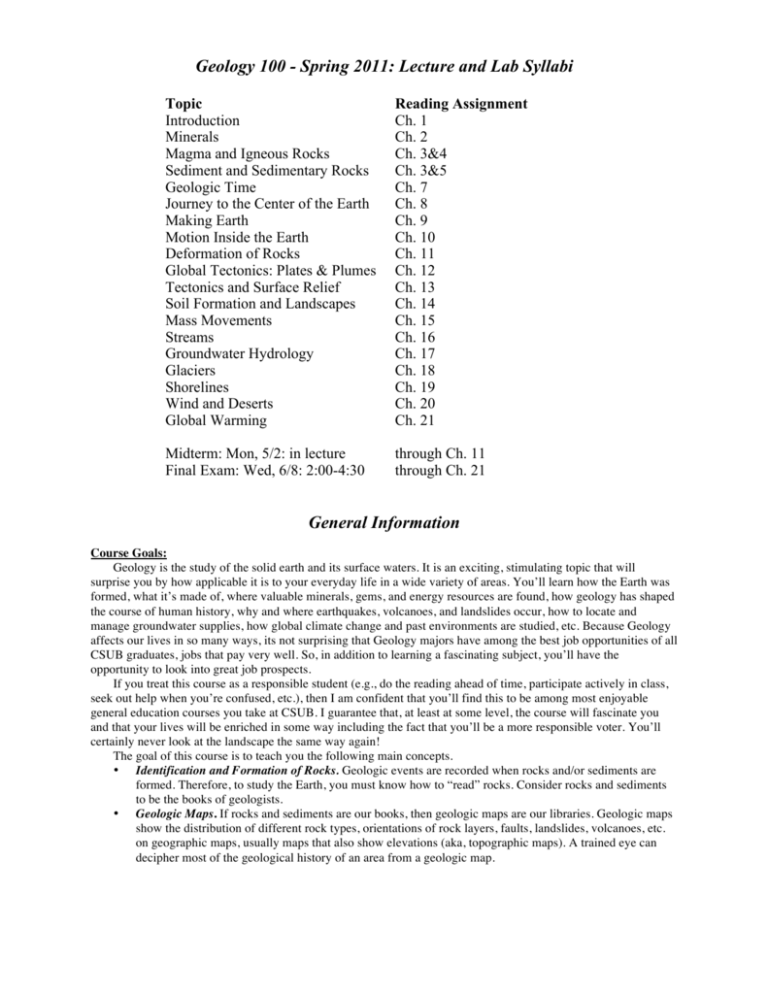
Geology 100 - Spring 2011: Lecture and Lab Syllabi Topic Introduction Minerals Magma and Igneous Rocks Sediment and Sedimentary Rocks Geologic Time Journey to the Center of the Earth Making Earth Motion Inside the Earth Deformation of Rocks Global Tectonics: Plates & Plumes Tectonics and Surface Relief Soil Formation and Landscapes Mass Movements Streams Groundwater Hydrology Glaciers Shorelines Wind and Deserts Global Warming Reading Assignment Ch. 1 Ch. 2 Ch. 3&4 Ch. 3&5 Ch. 7 Ch. 8 Ch. 9 Ch. 10 Ch. 11 Ch. 12 Ch. 13 Ch. 14 Ch. 15 Ch. 16 Ch. 17 Ch. 18 Ch. 19 Ch. 20 Ch. 21 Midterm: Mon, 5/2: in lecture Final Exam: Wed, 6/8: 2:00-4:30 through Ch. 11 through Ch. 21 General Information Course Goals: Geology is the study of the solid earth and its surface waters. It is an exciting, stimulating topic that will surprise you by how applicable it is to your everyday life in a wide variety of areas. You’ll learn how the Earth was formed, what it’s made of, where valuable minerals, gems, and energy resources are found, how geology has shaped the course of human history, why and where earthquakes, volcanoes, and landslides occur, how to locate and manage groundwater supplies, how global climate change and past environments are studied, etc. Because Geology affects our lives in so many ways, its not surprising that Geology majors have among the best job opportunities of all CSUB graduates, jobs that pay very well. So, in addition to learning a fascinating subject, you’ll have the opportunity to look into great job prospects. If you treat this course as a responsible student (e.g., do the reading ahead of time, participate actively in class, seek out help when you’re confused, etc.), then I am confident that you’ll find this to be among most enjoyable general education courses you take at CSUB. I guarantee that, at least at some level, the course will fascinate you and that your lives will be enriched in some way including the fact that you’ll be a more responsible voter. You’ll certainly never look at the landscape the same way again! The goal of this course is to teach you the following main concepts. • Identification and Formation of Rocks. Geologic events are recorded when rocks and/or sediments are formed. Therefore, to study the Earth, you must know how to “read” rocks. Consider rocks and sediments to be the books of geologists. • Geologic Maps. If rocks and sediments are our books, then geologic maps are our libraries. Geologic maps show the distribution of different rock types, orientations of rock layers, faults, landslides, volcanoes, etc. on geographic maps, usually maps that also show elevations (aka, topographic maps). A trained eye can decipher most of the geological history of an area from a geologic map. • • • Geologic Time. The earth was formed approximately four and a half billion years ago. In comparison, the Elizabethan English were performing Romeo and Juliet ~five hundred years ago. Thus, if the formation of the earth were considered to be at the beginning of a year, then everyone’s favorite romantic couple first died on stage three and half seconds before midnight on December 31st at the end of that year!!!!! Geologic time is not only difficult to comprehend; it is a critical concept for geologists. The age of rocks and sediments must be understood before one can search for oil, determine the effects of human activities on climate change, etc. Plate Tectonics. This is the unifying theory of geology. It is our principal paradigm. Almost all geological activity (e.g., earthquakes in California) can be explained and forecasted with the help of this grand model of the earth. The Mutual Impact of Society and the Earth. As our population grows at increasing rates, the importance of our relationship with the earth increases accordingly. On the one hand, the earth will have an increasing effect on us. For example, more and more people will be exposed to geologic hazards like landslides and floods as population centers spread out. We, in turn, will have an increasing effect on the earth. The depletion of natural resources such as soil, water, minerals, and petroleum and even the structure of our global climate will be increasingly impacted as population increases. Lecture Instructor: Rob Negrini, Sci II, Rm 276, 654-2185; rnegrini@csub.edu; Office Hrs: TTh 1-3:00 Lab Instructor: Staci Loewy, Sci II, Rm 338, 654-2550; sloewy@csub.edu; Office Hrs: MW 10-12:30 Grades: Lab Lecture Midterm Final Exam 35% 30% 35% 100% Lecture Textook: How Does Earth Work?, Physical Geology and the Process of Science, 2009, by Smith and Pun Keep in mind that there is a LOT of reading. DON”T GET BEHIND! Work inside of Class: Your performance on the exams in large part depends on taking careful, detailed notes in lecture and asking questions when you don’t understand something. If possible, bring your text class so that you can follow along with the reading and relevant illustrations. Again, DO NOT GET BEHIND WITH THE READING! Work outside of Class: Geology 100H is a five-unit course that represents one third of a full class load. As such, you’re expected to put in at least twice time working on the course outside of class as you spend in class. Besides studying for exams, etc., you are required to come to class prepared. This includes doing the required reading corresponding to both the lecture and lab sections. Also, rewriting your notes from the previous class helps a great deal with understanding the more complex material. Important!!: If you miss an exam, you will not be allowed to make it up unless you notify me before the exam begins. Even then, I will only give you a makeup under extraordinary conditions, so clear it with me first. In other words, don’t assume that I’ll let you make it up. I have an answering machine and I check my EMAIL all the time. Thus there are no excuses for not notifying me beforehand. Important!!: It is your responsibility and ethical obligation to not engage in academic dishonesty of any form (e.g., plagiarism). Details on campus policy toward violations in this area are provided in the CSUB Catalog which can be purchased in the bookstore or accessed online at the CSUB website: (www.csub.edu/catalog/2009-2011_regularlyUpdated/pages/013.pdf) Any violations will be punished without hesitation according to that policy. 2 Geology 100 Winter 2011 LAB SCHEDULE 1 Topic No Lab 2 Minerals 3 Igneous Rocks 4 Sedimentary Rocks 5 Metamorphic Rocks 6 Rock and Mineral Quiz 7 Planets 8 Plate tectonics-Volcanoes 9 Topographic maps and profiles 10 Streams, Rivers and Groundwater 11 No Lab Week 3
